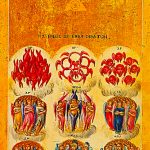Perhaps you can help me with this? I lack in depth knowledge of such things to adequately refute this video and I have a friend blasting me with it as her reason for stepping away from her faith. Maybe you or someone you know can respond in a way that would be far more convincing than my own… “Real Proof that Jesus was NOT real”
Maybe this will help a bit? Dunno if there has been a book-length treatment on this latest bit of Trutherism yet, but I expect so. “Jesus Never Existed” twaddle is, to my mind, indistinguishable from Holocaust Denial, theories that Shakespeare never existed, and black helicopter conspiracy theories. They seem to me to always miss the wood for trees by overlooking the obviously historical qualities of the documents and stringing together hypotheses, water cooler talk, and far-fetched scenarios. So, for instance, one of the readers of my article at Inside Catholic writes:
“If you are inventing a Messiah from scratch, you would never have him be from the first century equivalent of Bugtussle, Oklahoma [i.e., Nazareth]”
However, if you’re trying to invent a Messiah from pre-existing traditions, then it makes sense to “line up” your candidate with one or more popular prophetic musings about where Messiah would come from. The jews of that time were crowning dozens of candidates as messiahs,[Prove it.] and each group was cherry picking from one or more information streams passed down in jewish tradition.
“This complex relationship is, if you are just inventing a God, an enormous waste of time, leading to problems such as sects who honor John more than Jesus”
The John the Baptist figure was a necessary invention due to the popular ideas about some “Elijah” type figure coming before Messiah to prepare his way. [Great. Then there should be dozens of other Elijah figures for your dozens of other messiahs. Name them.]So, the followers of Jesus crowned John the Baptist as that Elijah-type figure. Here we see again that the first century jews were inventing a messiah by lining up Jesus and other contemporary figures with pre-existing jewish musings about what messiah might be.
Jesus was fashioned to fit numerous pre-existing profiles of messiah, and this was good enough to convince his followers, but not most other jews or skeptics. [Right. That’s no doubt why Peter’s reaction to Jesus’ prophecy of crucifixion was, “Right behind you, Chief!” and Jesus’ response was, “You’ve always understood me, Peter. Way to go!”] It’s too hard to make any messianic claimant fit all the prophetic traditions associated with him. You have to cherry pick some, and then close associates will find it convincing enough.
All this is quite silly. The question is precisely, “If you are going to cherry pick Jewish scripture to invent somebody named Jesus, why the hell would you invent this Jesus?” It’s a method of conspiratorial skepticism that is impervious to common sense, because it is not actually looking at evidence, but is instead foreordaining the conclusion that Jesus never existed and then shoehorning anything and everything into the service of that conclusion, no matter how ridiculously incompatible the evidence may be for it.
Remember Chesterton’s definition of madness:
Every one who has had the misfortune to talk with people in the heart or on the edge of mental disorder, knows that their most sinister quality is a horrible clarity of detail; a connecting of one thing with another in a map more elaborate than a maze. If you argue with a madman, it is extremely probable that you will get the worst of it; for in many ways his mind moves all the quicker for not being delayed by the things that go with good judgment. He is not hampered by a sense of humour or by charity, or by the dumb certainties of experience. He is the more logical for losing certain sane affections. Indeed, the common phrase for insanity is in this respect a misleading one. The madman is not the man who has lost his reason. The madman is the man who has lost everything except his reason.
The madman’s explanation of a thing is always complete, and often in a purely rational sense satisfactory. Or, to speak more strictly, the insane explanation, if not conclusive, is at least unanswerable; this may be observed specially in the two or three commonest kinds of madness. If a man says (for instance) that men have a conspiracy against him, you cannot dispute it except by saying that all the men deny that they are conspirators; which is exactly what conspirators would do. His explanation covers the facts as much as yours. Or if a man says that he is the rightful King of England, it is no complete answer to say that the existing authorities call him mad; for if he were King of England that might be the wisest thing for the existing authorities to do. Or if a man says that he is Jesus Christ, it is no answer to tell him that the world denies his divinity; for the world denied Christ’s.
Nevertheless he is wrong. But if we attempt to trace his error in exact terms, we shall not find it quite so easy as we had supposed. Perhaps the nearest we can get to expressing it is to say this: that his mind moves in a perfect but narrow circle. A small circle is quite as infinite as a large circle; but, though it is quite as infinite, it is not so large. In the same way the insane explanation is quite as complete as the sane one, but it is not so large. A bullet is quite as round as the world, but it is not the world. There is such a thing as a narrow universality; there is such a thing as a small and cramped eternity; you may see it in many modern religions. Now, speaking quite externally and empirically, we may say that the strongest and most unmistakable mark of madness is this combination between a logical completeness and a spiritual contraction. The lunatic’s theory explains a large number of things, but it does not explain them in a large way.
It is impossible for me to listen to the sundry “Jesus never existed” scenarios without detecting exactly this mark of madness about them.















